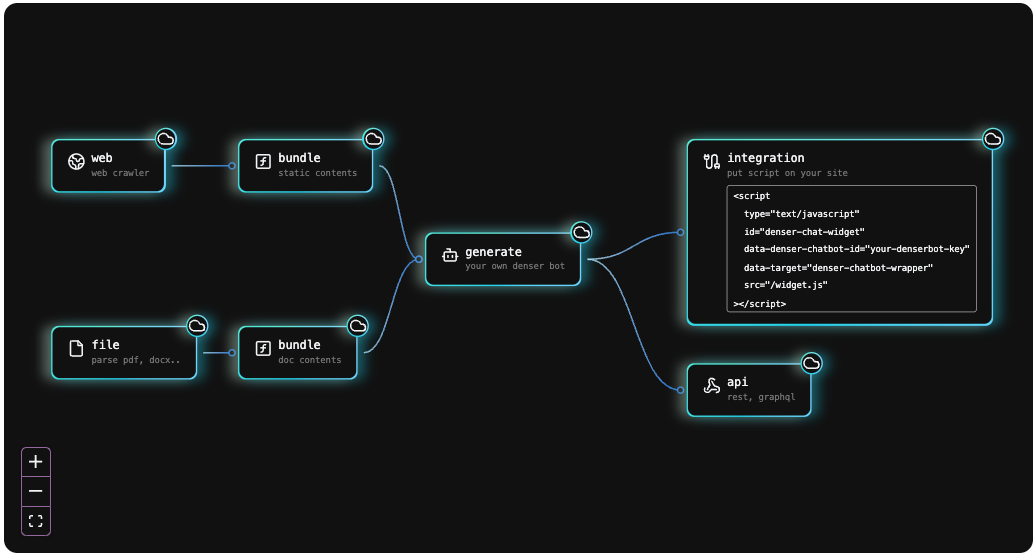
5 Chatbot Development Companies In 2025

Chatbots are essential tools for businesses that want to improve customer service, increase engagement, and provide personalized responses.
They can handle customer inquiries, automate routine tasks, and help businesses focus on growth.
With the growing demand for these smart tools, choosing the right chatbot development company is essential for business success.
Finding the right chatbot partner means looking beyond technical skills. You need a company that understands your business and can create a chatbot that adds value.
Key factors like the company's experience, pricing, and post-launch support are important to make sure your chatbot works at its best.
In this article, we’ll explore what to consider when choosing a chatbot development company and introduce you to the best options to suit your organization's needs.
Different Types of Chatbots Created by Development Companies#
Chatbot development services offer various solutions catering to different business needs.
Choosing the right type of chatbot can affect how your business interacts with customers, handles inquiries, and processes data.
Below are the main types of chatbots that development companies create, along with the industries or use cases for which they are best suited.
AI-Powered Chatbots#
AI-powered chatbots use artificial intelligence and machine learning to provide dynamic responses based on user input.
These chatbots get smarter over time, learning from previous interactions to improve their accuracy and relevance.

These chatbots are particularly useful for industries where customer inquiries, such as healthcare, finance, and e-commerce, can be complex and varied.
Denser.ai is a great chatbot development company that excels in creating AI-powered chatbots, offering continuous learning and adaptation based on user input.
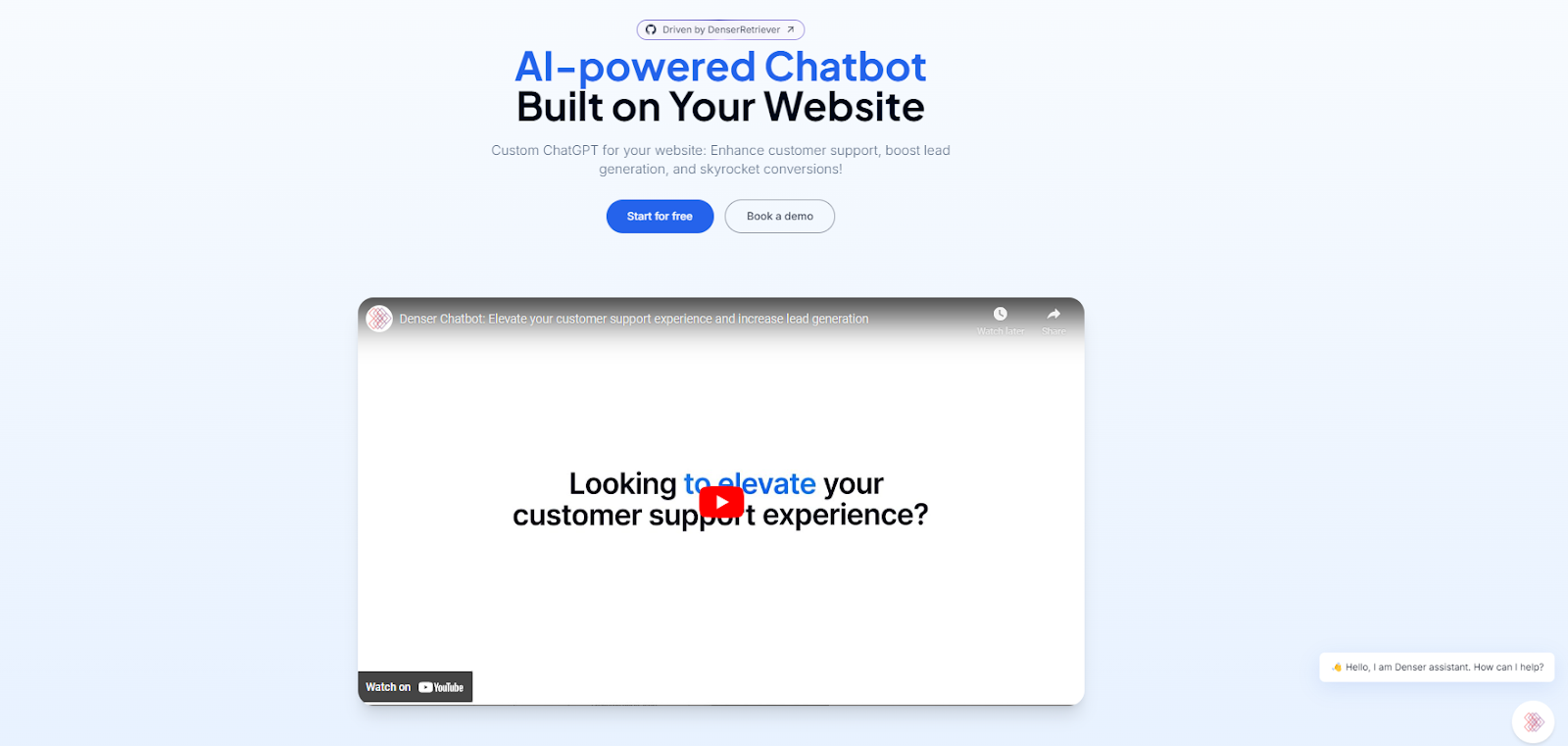
Rule-Based Chatbots#
Rule-based chatbots are simpler and operate on pre-defined rules and scripts. They can only respond to specific commands or questions programmed into their system.
While they are not as flexible as AI-powered chatbots, they are perfect for handling repetitive and simple tasks.
Key features of rule-based chatbots:
- Pre-set rules: These bots follow a predefined flow, offering users limited choices or options to interact with.
- Cost-effective: Rule-based chatbots are generally less expensive to develop and maintain.
- Faster deployment: Since they don't require machine learning or NLP, they can be deployed faster than AI-powered chatbots.
Rule-based chatbots are ideal for businesses with predictable customer inquiries, such as appointment scheduling, FAQ responses, or basic customer support.
Hybrid Chatbots#
Hybrid chatbots combine the best of both AI-powered and rule-based approaches.
They start by guiding users through a predefined flow but can switch to AI-powered responses when the interaction becomes more complex.
Key features of hybrid chatbots:
- Flexibility: Businesses can start with a basic rule-based flow and introduce AI elements where needed.
- Better user experience: These chatbots can handle a broader range of queries while maintaining a structured conversation flow.
- Cost vs. benefit balance: While more expensive than purely rule-based chatbots, hybrid chatbots offer a middle ground for businesses needing flexibility and control.
Hybrid chatbots are well-suited for customer service applications where simple queries can be handled with pre-set rules, but more complex interactions might require AI intervention.
Key Factors to Consider in Chatbot Development Companies#
There are multiple factors to weigh before making your decision. Below, we break down the key aspects to help you identify the best company for your needs.
Natural Language Processing (NLP)#
Natural Language Processing (NLP) is essential for chatbots to understand and respond to human language in a natural, conversational way. It helps the bot interpret user intent and provide relevant answers even if the wording varies.
For example, whether a customer asks, "What's the price?" or "How much does it cost?" the chatbot will understand the same request.
A chatbot with good NLP capabilities can also handle the flow of a conversation, remembering past interactions to maintain context and provide a seamless experience.
Additionally, NLP enables features like sentiment analysis, which helps the chatbot recognize the emotional tone of a message and respond accordingly. It also allows for multi-language support, making chatbots useful for businesses in different regions.
Custom Chatbots with Personality#
A chatbot with personality can reflect your brand's voice, whether it's friendly, professional, or playful. It adds a connection layer with users, making the interaction more memorable. Instead of a robotic response, the chatbot can greet users with a unique tone and style that aligns with your business.
In addition to personality, a custom chatbot can be designed to offer contextual responses based on the user's input and needs.
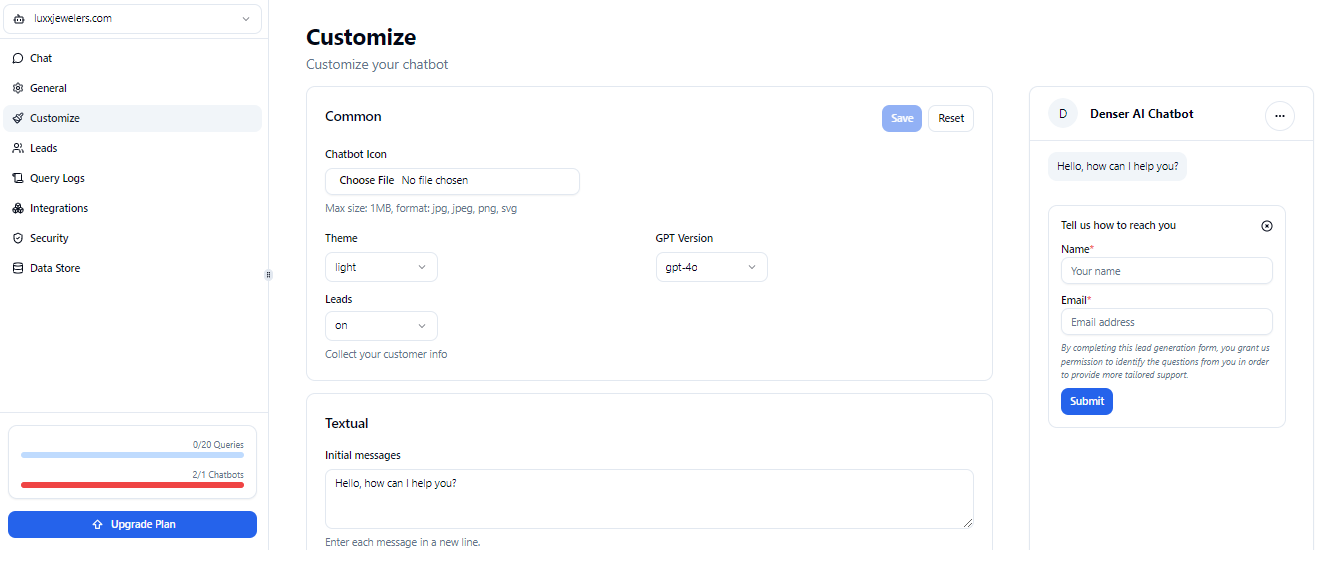
For example, a chatbot can adjust its conversation flow depending on whether a customer asks about product details or needs help with an order.
This makes the experience more personal and tailored, helping to increase customer satisfaction.
A good chatbot development company will take the time to understand your business and ensure the chatbot's personality fits seamlessly into your brand while providing relevant, dynamic responses.
Pop-up Chat for Website Visitors#
A pop-up chat feature is one of the most effective tools for immediately engaging with website visitors.
When a chatbot automatically appears on the screen when someone lands on your website, it creates an opportunity for instant communication.
Pop-up chats can be triggered based on specific visitor behaviors, such as time spent on a page or scrolling to a certain section. This helps tailor the timing of the pop-up to when the user is most likely to engage with it.
The primary advantage of pop-up chat is its ability to improve user experience by offering real-time assistance without requiring the user to search for help.
For instance, a chatbot can welcome visitors with a friendly message like, "Need help finding something?" or "Have questions? I'm here to assist!"
This reduces friction for users who may otherwise leave the site if they cannot quickly find what they need. It's especially effective for guiding visitors through purchasing, answering FAQs, or offering product recommendations.
Additionally, for e-commerce websites, pop-up chatbots can help reduce cart abandonment by assisting users in real-time with product details, shipping queries, or discount codes.
Pricing#
The most common options include fixed price, time and materials, and subscription-based models.
In a fixed-price model, you pay a set fee for the entire project, which works well for simpler chatbot solutions where the scope is clearly defined. This option offers cost predictability but may limit flexibility if changes are needed later.
On the other hand, the time and materials model charges based on the actual work done, making it ideal for more complex, evolving projects like AI-powered chatbots. However, costs can increase if the project becomes more complicated.
The subscription-based model is common for chatbot platforms, where you pay a recurring fee that covers ongoing access, updates, and support. This is ideal for businesses that need continuous improvements and scalability but comes with ongoing expenses that grow with usage.
Additionally, some chatbot development companies offer custom pricing for highly specialized or large-scale projects, where the chatbot is built entirely from scratch based on unique business needs.
Integrations#
Integration ensures the chatbot works seamlessly with tools like CRMs, e-commerce platforms, customer support systems, and payment gateways.
Without smooth integration, you risk creating a disjointed experience for your customers and internal teams.
A chatbot integrated with your CRM system can automatically pull customer data to provide personalized responses or log interactions for future reference.
Similarly, integrating with e-commerce platforms like Shopify or WooCommerce allows the chatbot to assist with product searches, order tracking, and payment processing.
The more integrated your chatbot is, the more effectively it can streamline workflows, reducing the need for manual intervention and providing better service.
In addition, integrating your chatbot with marketing tools, email platforms, or analytics systems can offer valuable insights into user behavior and chatbot performance. It allows businesses to refine their strategies and optimize customer interactions based on real data.
5 Chatbot Development Companies You Should Consider#
Whether you're a small business looking to automate simple tasks or a large enterprise needing advanced AI-driven solutions, there's a platform for your needs.
Below are the top chatbot development companies that offer unique features to suit different business needs.
1. Denser.ai#
Denser.ai is the ideal chatbot development platform for businesses seeking ease of use and advanced capabilities.
This chatbot-based platform combines a simple, intuitive interface with powerful AI-driven tools that make it accessible to companies of all sizes.
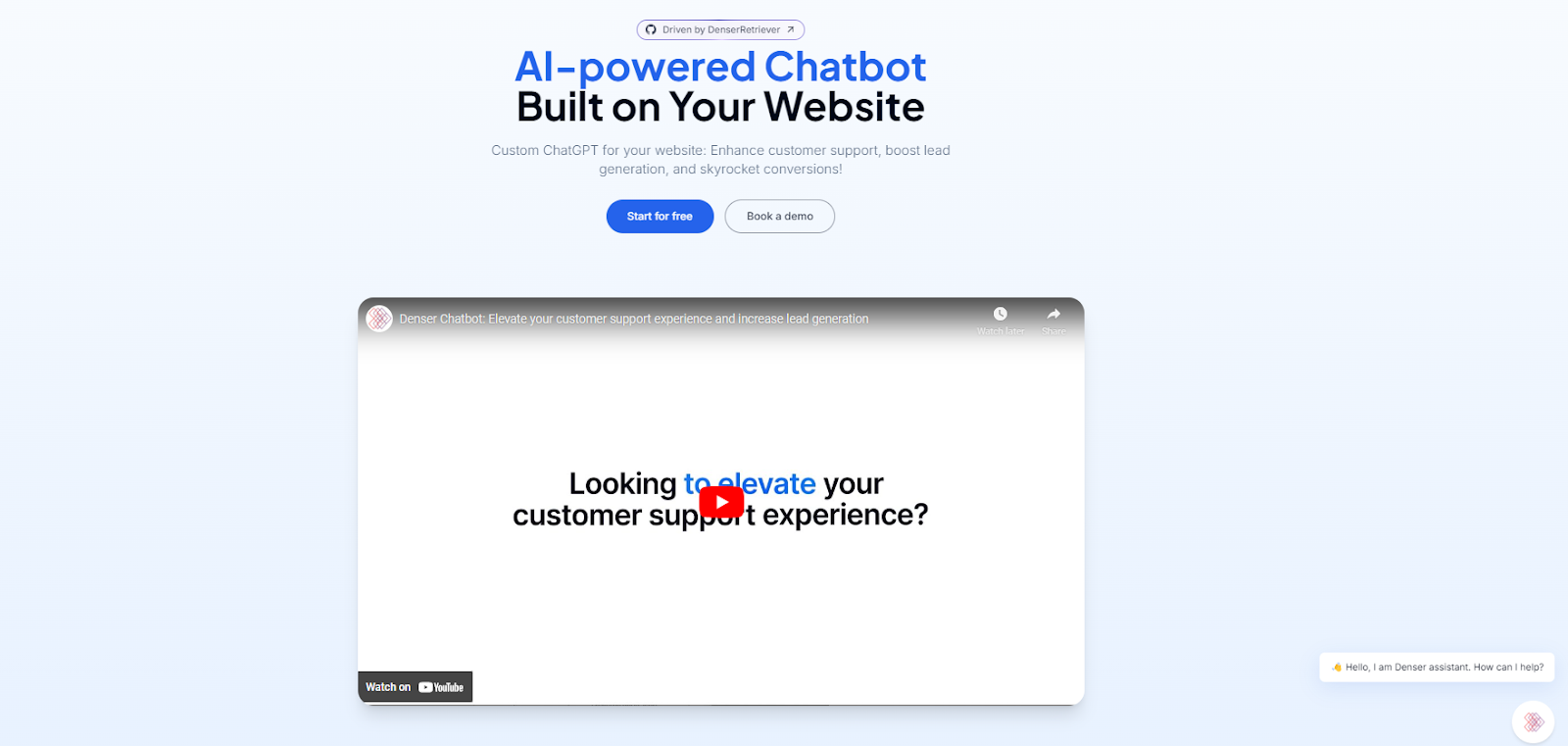
A key advantage of Denser.ai is its advanced semantic AI. This allows chatbots to understand and respond to customer questions naturally.
With Denser.ai, you can automate routine customer inquiries while allowing live agents to focus on more complex issues.
This chatbot development company integrates easily with popular platforms like Shopify, Zapier, and WordPress.
This makes it a great solution if you need a versatile chatbot that works across different platforms for improved customer service and operations.
In addition, Denser.ai's customizable chatbot builder lets you personalize interactions to meet customer needs.
The platform's training tools allow chatbots to learn and improve over time, providing more accurate responses as they gather data.
Sign up for a free trial or schedule a demo today.
Denser.ai Pricing Plans#
This conversational AI platform offers flexible pricing plans to ensure you get the features you need at a price that works for you:
- Free Plan: Perfect for startups and lets you try out basic features at no cost
- Starter Plan: $19/month, ideal for individual users or small startups that need essential features
- Standard Plan: $89/month, designed for small teams that need more advanced tools to manage customer interactions
- Business Plan: $799/month, tailored for larger businesses that require a full suite of features to handle more complex customer needs
For enterprise-grade solutions, Denser.ai also offers scalable options for large businesses. You can contact the Denser sales team for details on exploring custom solutions and pricing.
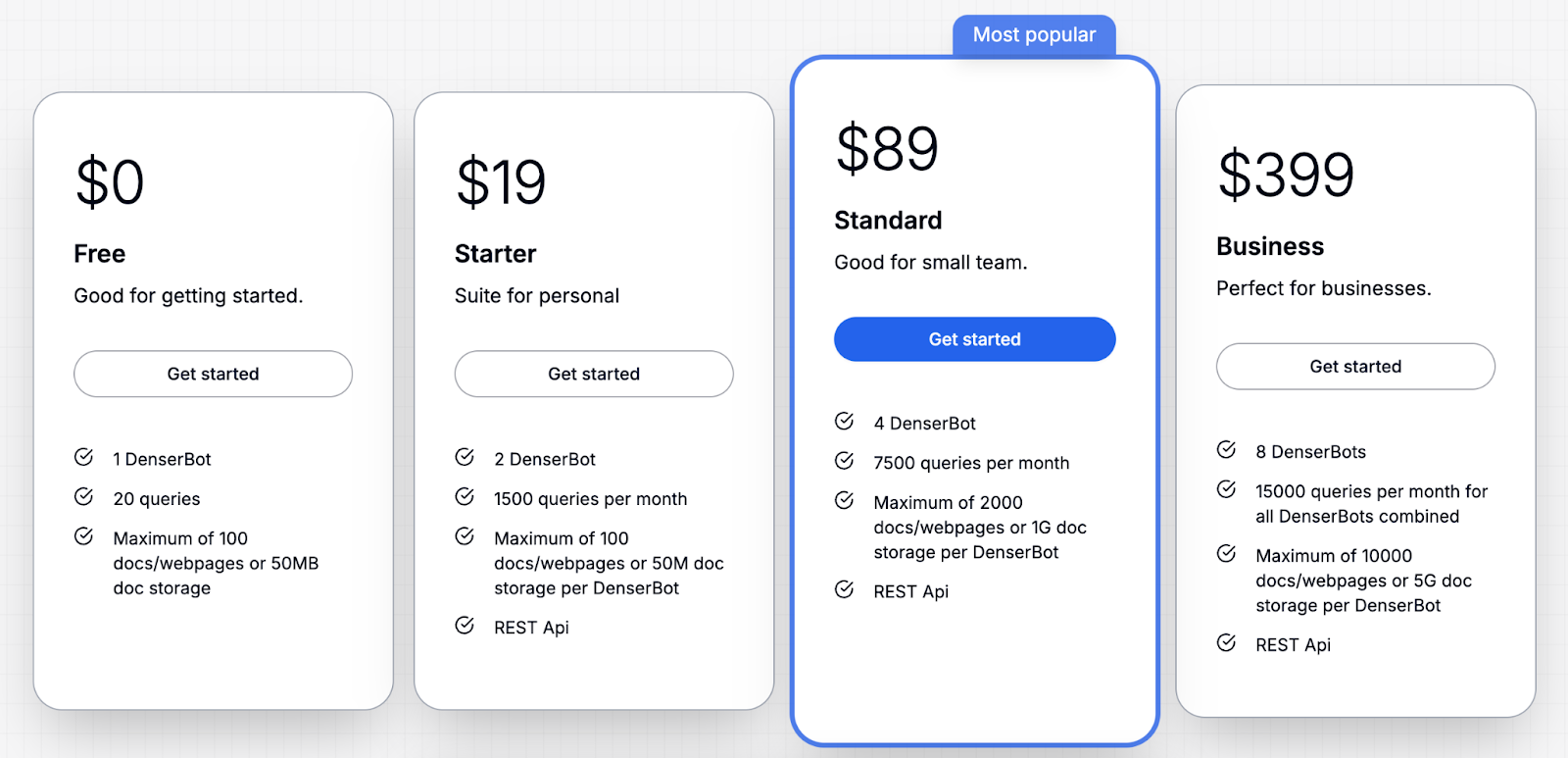
Sign up for a free trial or schedule a demo today.
2. Chatfuel#
Chatfuel is a user-friendly platform that helps create AI chatbots without coding skills. It offers simple editing tools, so users can easily design chatbots by setting up conversational rules.
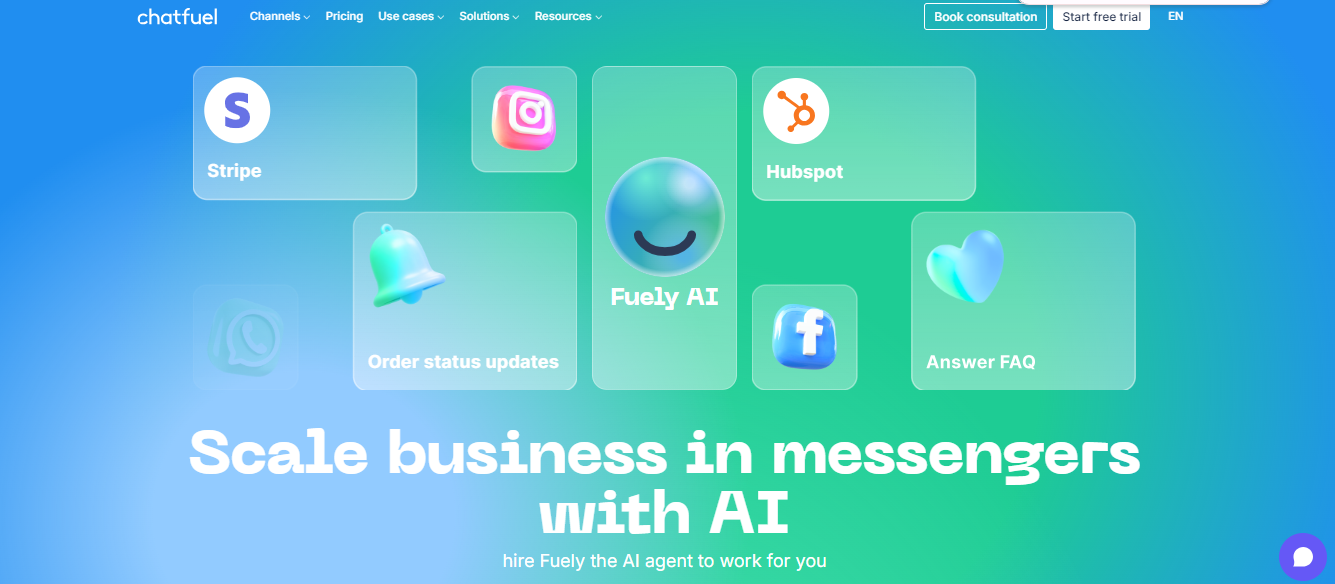
Image Source: Chatfuel
These rules help the chatbot understand and respond to user questions using built-in natural language processing (NLP).
Chatfuel also integrates smoothly with platforms like Facebook, Twitter, and Dropbox, allowing users to connect their chatbot to popular services.
Chatfuel's chatbots can be tailored to different needs, whether for customer service, event assistance, or personal use.
Additionally, Chatfuel provides analytics tools that help users track and improve their chatbot's performance, giving valuable insights into how well the chatbot is working.
Chatfuel offers a simple yet powerful solution for creating flexible and effective chatbots.
Pros#
- Many features for building complex chatbots
- Connects with other systems for automation and webviews
- Support available for launching on Messenger
Cons#
- Fewer features compared to other platforms
- May be costly for large businesses
Pricing#
There are two subscription plans available: Facebook, Instagram, and WhatsApp.
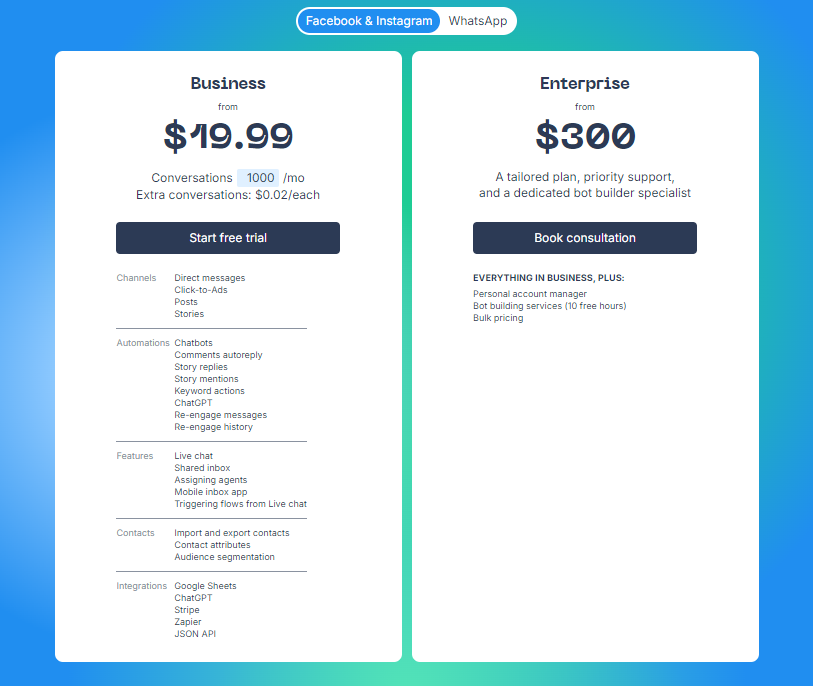
Image Source: Chatfuel
- The Business plan is priced at $19.99 per month for Facebook and Instagram and $49.49 per month for WhatsApp.
- The Enterprise plan covers all three platforms and costs $300 per month.
3. ManyChat#
ManyChat is an easy-to-use platform that helps businesses automate conversations across text messages, Facebook Messenger, and Instagram.
It lets businesses send personalized messages like discount coupons, booking confirmations, and promotions through email and text.
For eCommerce, ManyChat integrates with Shopify to remind customers of abandoned carts and encourage purchases.
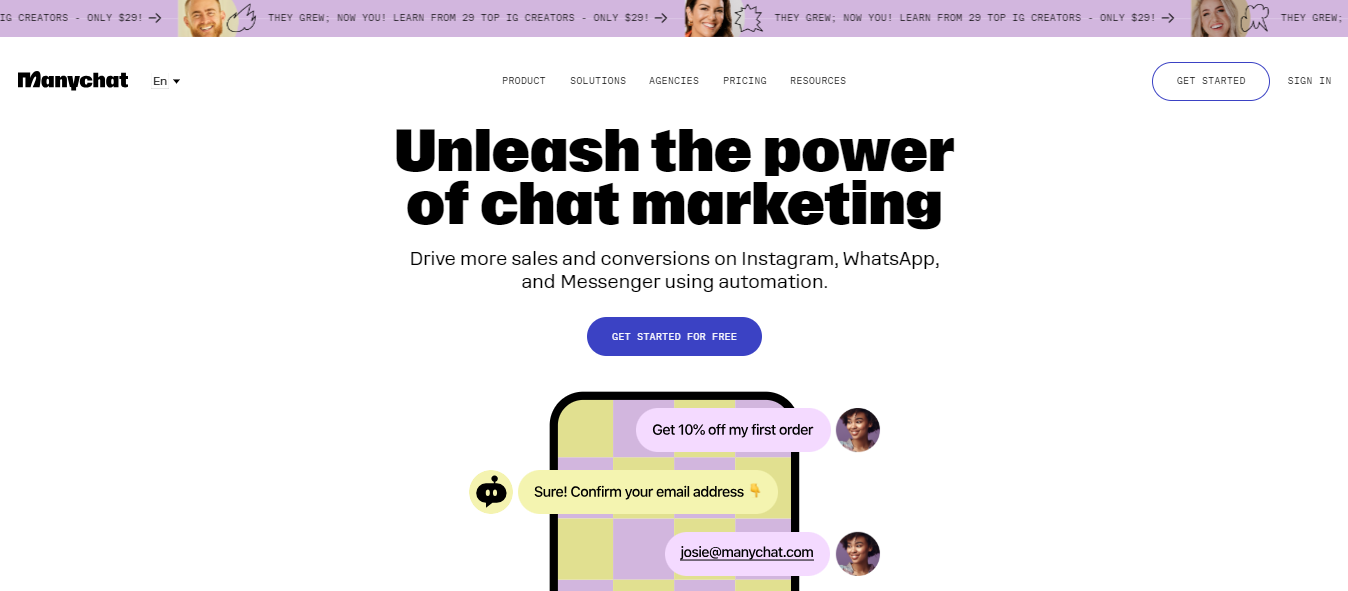
Image Source: ManyChat
With ManyChat, teams can book appointments, send reminders, and collect feedback using a single dashboard.
You can also segment customers with tags, set up custom keyword triggers, and run automated campaigns.
ManyChat offers A/B testing and performance analytics to optimize marketing campaigns. It also provides built-in templates and a drag-and-drop interface for creating personalized chatbot flows easily.
Pros#
- Easy to set up automation on Instagram
- Simple visual flow builder
- Can create and reuse templates
- Supports media and external links in chatbots
Cons#
- Chatbot sometimes has issues with Facebook Messenger
- Pro subscription can be pricey
Pricing#
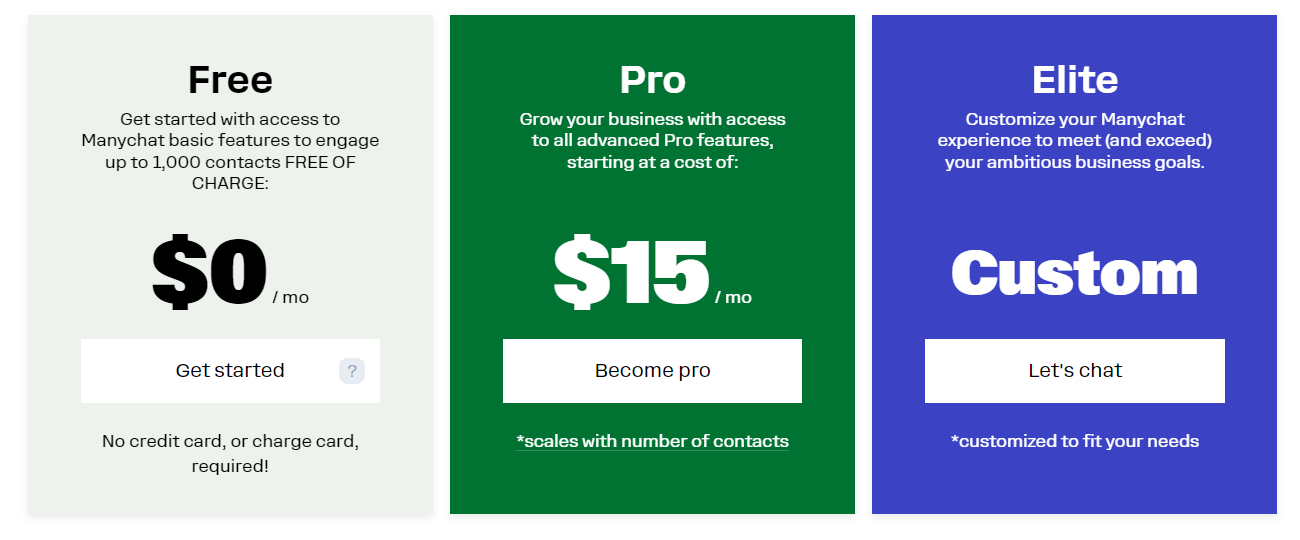
Image Source: ManyChat
- Free Plan: Offers essential features to engage with up to 1,000 contacts
- Pro Plan: Priced at $15 per month, unlocking all advanced features to help grow your business
- Elite Plan: Custom pricing with tailored features for a fully personalized experience
4. Intercom#
Intercom is an AI-based customer service platform that improves customer and support team experiences.
It offers a no-code solution for building and customizing bots that makes it easy to simplify customer support.
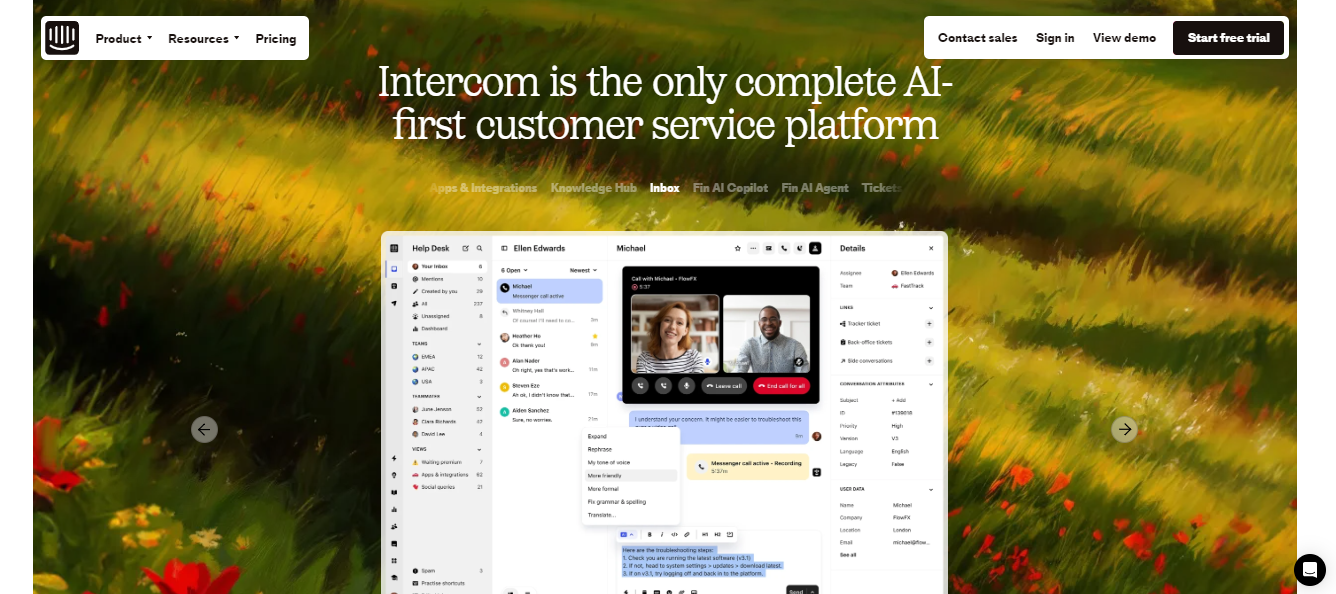
Image Source: Intercom
These Custom Bots gather important information from customers upfront. You can also proactively engage high-intent leads by launching a bot to interact with potential customers.
Once qualified, a lead moves directly into a conversation to speed up conversions.
Pros#
- Simple and easy-to-use interface
- Ability to create automated communication series
- Simple to navigate with useful features
- Option to send events to customize series
Cons#
- Limited automation and segmentation features on basic plans
- Takes time to fully deploy the solution
- No free WhatsApp integration is offered
Pricing#
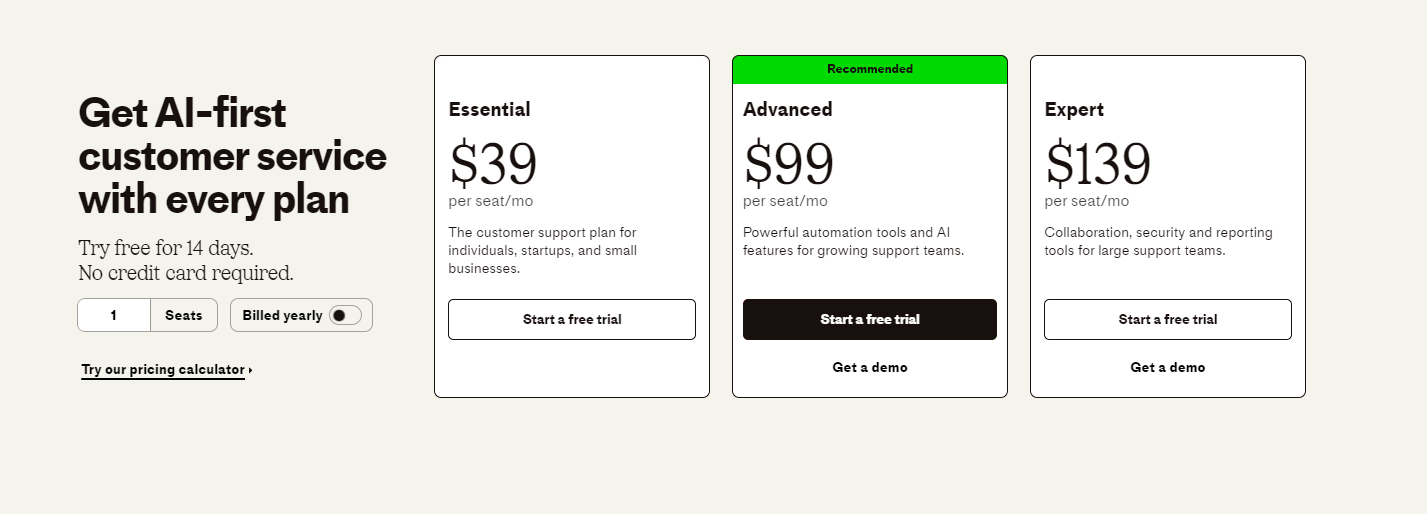
Image Source: Intercom
- Essential Plan: $39 per seat/month with access to fundamental tools
- Advanced Plan: $99 per seat/month with upgraded features.
- Expert Plan: $139 per seat/month, including full access to the most advanced tools and functionalities
5. LivePerson#
LivePerson lets businesses easily create AI chatbots to automate customer conversations. It combines AI-powered chatbots and human agents to provide personalized, meaningful interactions.
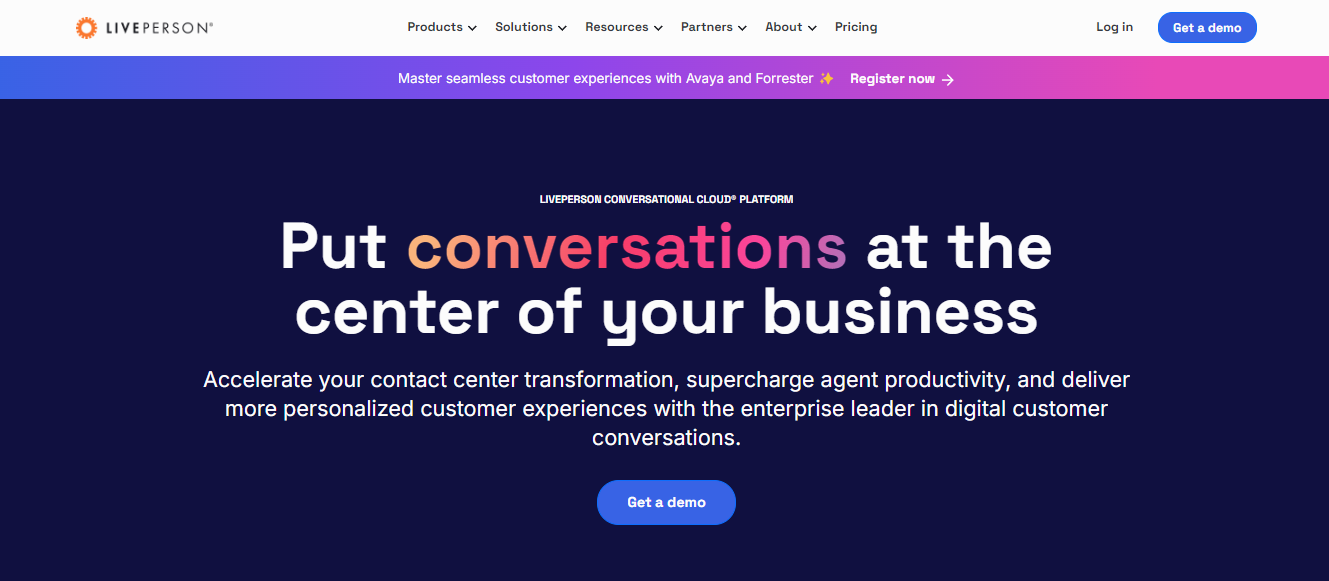
Image Source: LivePerson
With Conversation Builder, you can design automated chat flows without coding that handle routine questions while human agents manage more complex issues.
Pros#
- Offers bulk messaging and clear chat management
- Handles simple and complex chatbot requests
- Easy to customize and configure
- Provides useful analytics and reports
Cons#
- Can't disable languages without an agent
- No separate message limits for channels
- Some features are hard to find
Pricing#
The Bronze, Silver, and Gold plans come with custom pricing options.
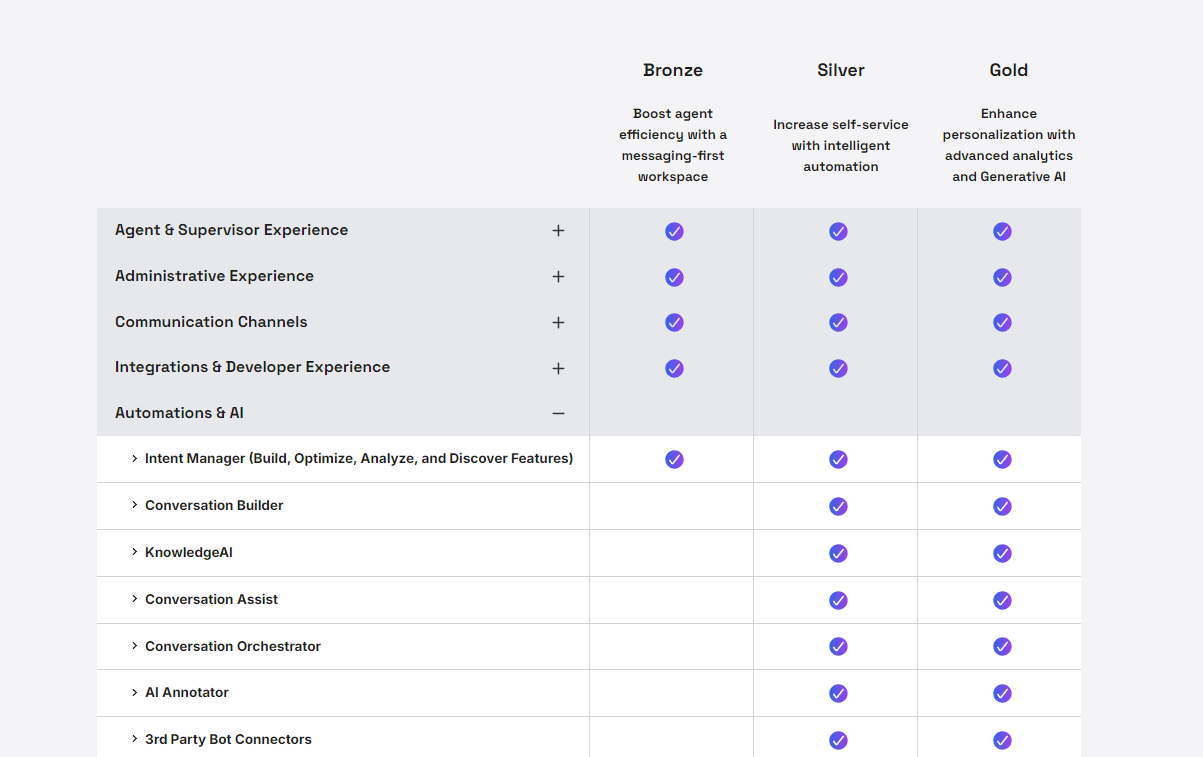
Image Source: LivePerson
The Bronze plan is designed for small businesses, the Silver plan is ideal for expanding businesses, and the Gold plan caters to larger businesses with more advanced requirements.
Why Denser.ai is the Best Choice for Chatbot Development#
Denser.ai is a powerful, all-in-one solution transforming how you interact with customers. The platform's user-friendly interface makes building and managing chatbots seamless for tech experts or non-technical users.
This AI customer service chatbot offers multi-use functionality across websites, manage documents, and deploy AI-driven conversations to engage with your audience.
What sets Denser.ai apart is its advanced AI-driven analytics that provide deep insights into customer behavior. It allows you to improve user engagement and tailor experiences that resonate with your audience.
Unlike platforms that merely track basic metrics, Denser.ai provides deep insights into customer behavior, enabling businesses to truly understand and improve user engagement.
This makes Denser.ai not just a chatbot platform but a strategic tool for driving customer satisfaction and growth.
Furthermore, this AI chatbot development platform's semantic search capabilities ensure that chatbots can deliver accurate, context-aware responses to make interactions less robotic.
How to Build Your First Chatbot with Denser.ai#
When it comes to AI chatbot solutions, Denser.ai offers powerful features and a no-code interface that makes it a top choice for businesses of all sizes.
Here's a step-by-step guide to building your first chatbot using Denser.ai:
Step 1: Sign up with Denser.ai#
Create your free account on Denser, where you'll get 2 Free Denserbots.
After signing up, you can integrate the chatbot into your website in different ways—via a chat widget, an iframe, or Denser's REST API.
The platform's user-friendly interface makes setting up the bot quick and painless, even without a technical background.
Step 2: Build Your Chatbot#
Once registered, you can start building your chatbot. Denser.ai provides a code snippet to add to your website's HTML.
This code links your chatbot to your Denser.ai account, which allows the chat widget to function on your website.
Step 4: Customize and Train Your Bot#
With Denser.ai, you can easily choose a chatbot template that suits your business. You can customize it to handle frequently asked questions, business-specific queries, and more.
The platform also allows you to train the bot to improve its responses over time to become more effective as it learns from user interactions.
Step 5: Establish Human Escalation Triggers#
Not all issues can be handled by a chatbot. To ensure a smooth user experience, set up escalation triggers to transfer more complex inquiries to human agents.
These triggers might include specific keywords, complex questions, or signs of user frustration.
Step 6: Integrate with Your Business Systems#
One of Denser.ai's strengths is its ability to integrate with your existing systems like CRMs, ERPs, and email platforms.
Plan out which systems the bot needs to connect with, and use Denser.ai's built-in integration capabilities to sync with your business processes.
Step 7: Launch and Optimize#
Before going live, ensure everything works perfectly by reviewing all integrations, dialogue flows, and interface elements. Once everything is tested and ready, launch your chatbot across your preferred platforms.
See How Denser.ai Ranks Among Top Chatbot Development Companies#
Looking for the best chatbot solution for your business?
Denser.ai offers a top-tier chatbot development service, creating AI-powered chatbots designed to meet your business needs.
From automating customer service to increasing sales and handling complex inquiries, Denser integrates with your existing systems to deliver real-time results.
If you're ready to partner with one of the leading chatbot development companies, now's the time to experience Denser.ai.
See how this innovative chatbot technology can help you automate processes, improve customer experience, and grow your business.

Sign up for a free trial or schedule a demo now.
FAQs About Bot Development Companies#
How does a chatbot deal with customer feedback?#
Chatbots can be programmed to collect customer feedback through automated surveys or conversations after resolving an issue or completing a sale. They can compile this feedback into reports, providing insights into customer satisfaction, service quality, and areas for improvement.
Can a chatbot recognize returning customers?#
Chatbots can recognize returning customers by integrating with your CRM or user databases. When a returning user interacts with the bot, it can pull up relevant details, such as previous conversations, order history, or preferences, allowing for more personalized interactions.
How are chatbots optimized for mobile users?#
Chatbots are typically optimized for mobile use, providing seamless experiences across devices, whether users interact via a mobile browser, app, or messaging platform like WhatsApp. Mobile-optimized chatbots are responsive, fast, and easy to use on small screens.